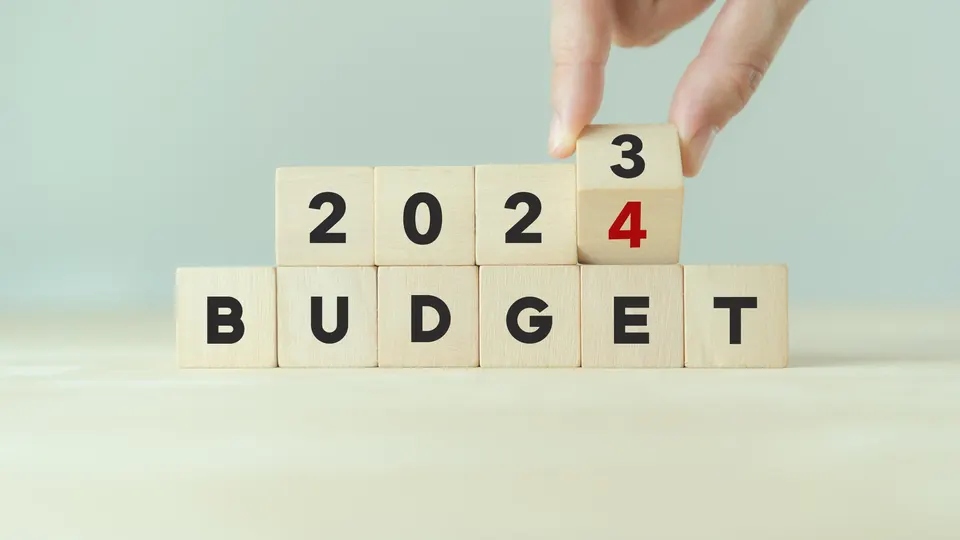Ways To Make A Budget You Can Keep In 2024 - Proven Strategies For The New Year
Unlock financial success in 2024 with this comprehensive guide about ways to make a budget you can keep in 2024. Master the art of budgeting and achieve your goals!
Author:Camilo WoodReviewer:Emmanuella SheaDec 30, 2023558 Shares46.5K Views

As the calendar turns to a new year, many individuals embark on the journey of financial planning, and at the core of this endeavor lies the creation of a budget. Crafting a budget isn't just about restricting spending; it's a strategic tool for achieving financial goals and cultivating a stable financial future. This comprehensive guide explores effective ways to make a budget you can keep in 2024.
A new year is approaching, and a lot of individuals intend to concentrate on their New Year's resolutions in order to start 2024. Being more frugal with money is another popular resolution made at the beginning of the year. It's a noble undertaking that can be accomplished with dedication and time.
Making better financial decisions all year long requires budget creation. It's also critical to budget wisely, which entails establishing attainable objectives to improve your financial situation going forward.
Anjali Pradhan, a Certified Financial Advisor (CFA) and the CEO of Dahlia Wealth, suggests zooming out and taking a broad view while creating a budget for 2024.
Anjali said:
“„I suggest to my clients to know their financial ‘Why’. Most budgeting attempts fail because people lose motivation when things get tough. Knowing why you are budgeting makes something that would otherwise be seen as a sacrifice, instead as a step towards your ideal life.- Anjali Pradhan
Pradhan believes that the "why" need to be joyous and pleasant. Debt repayment shouldn't be the goal.
She said:
“„For example, my financial ‘why’ is saving for a cottage,” she pointed out. “When I have to forgo buying something, I think about the joy I’ll have with my friends and family over the campfire. It then doesn’t feel as difficult or sad. It’s part of the plan and needs to be done in order to reach my goal.- Anjali Pradhan
Here are some ways to make a budget you can keep in 2024 and position yourself for long-term financial success.
Set Up Your Monthly Budget Dates For 2024 Now!
By taking out your calendar today, you can start 2024 off strong. Establish a non-negotiable, uninterrupted time slot for a regular meeting with your roommate, partner, family, or anybody else.
Begin each meeting with a single task to help you make financial improvements for the month. A few instances are:
- Make a call to the customer support number you've been dreading to have that bill rectified.
- Make sure you pay off all of your credit card debt.
- Transfer funds from a checking to a savings account with a high rate.
- Close any accounts you have no use for.
Assess Your Current Financial Situation
Assessing your current financial situation is the foundational step in creating a budget that stands the test of time. Begin by compiling a comprehensive overview of your income, including salary, bonuses, and any additional revenue streams. Take note of your monthly inflow, ensuring accuracy and inclusivity.
Next, turn your attention to your expenses. Categorize them into fixed and variable costs. Fixed costs include mortgage or rent, utility bills, and insurance, while variable costs encompass groceries, dining out, and entertainment. Scrutinize bank statements and receipts to capture all expenditures accurately.
Identify outstanding debts, such as credit cards, loans, or any financial obligations. Recognizing these commitments is crucial for crafting a budget that accommodates debt repayment alongside other financial goals.
Consider emergency savings and investments in your assessment. Evaluate the current state of your emergency fund and review investment portfolios. Understanding your financial safety net and investment performance contributes to a holistic view of your financial health.
Reflect on any significant life changes or upcoming expenses. Whether it's planning for a wedding, education expenses, or a home purchase, acknowledging these future financial events ensures proactive budgeting.
Set Clear Financial Goals
With a comprehensive understanding of your financial landscape, the next step is setting clear and achievable financial goals. These goals serve as the guiding principles for your budget, offering direction and purpose to your financial planning.
Start by distinguishing between short-term and long-term goals. Short-term goals may include building an emergency fund, taking a vacation, or paying off a credit card. Long-term goals encompass saving for a home, retirement, or your children's education.
Assign specific, measurable, achievable, relevant, and time-bound (SMART) criteria to each goal. For example, rather than a vague goal like "save money," set a specific target, such as "save $5,000 for an emergency fund by the end of the year."
Prioritize your goals based on urgency and importance. This hierarchy helps you allocate resources effectively, ensuring that essential goals take precedence while still making progress toward others.
Consider aligning your goals with the 50/30/20 rule, allocating a percentage of your income to needs, wants, and savings/debt repayment. This ensures a balanced approach that facilitates goal achievement without compromising essential living expenses.
Categorize Your Expenses
Organizing your expenses into categories is a pivotal aspect of creating a budget you can sustain. This categorization provides clarity on where your money is going, enabling informed decision-making and resource allocation.
Common expense categories include:
- Housing -Mortgage or rent, property taxes, homeowners' association fees.
- Utilities -Electricity, water, gas, internet, and phone bills.
- Groceries -Food and household essentials.
- Transportation -Fuel, public transportation, maintenance.
- Insurance -Health, life, auto, and home insurance.
- Debt Payments -Credit card payments, loan repayments.
- Entertainment -Dining out, movies, subscriptions.
- Personal Care- Health expenses, toiletries, grooming.
- Savings -Emergency fund, retirement savings, investments.
- Irregular Expenses -Occasional costs, such as gifts, maintenance, or annual subscriptions.
Categorizing expenses facilitates a detailed breakdown of your spending habits, enabling you to identify areas for adjustment and ensuring comprehensive coverage of your financial obligations.
Differentiate Between Needs And Wants
One of the key elements in making a budget that stands the test of time is the ability to differentiate between needs and wants. Needs are essential for survival and maintaining a reasonable quality of life, while wants are desires that enhance comfort or enjoyment but are not vital for basic well-being.
Start by identifying your needs, which typically include housing, utilities, groceries, and essential healthcare. These are non-negotiable expenses that ensure your fundamental needs are met. Evaluate these needs in the context of your current financial situation to determine the essential costs that must be covered.
Once needs are established, turn your attention to wants. Wants encompass discretionary spending on non-essential items such as dining out, entertainment, and luxury purchases. While these add value to your life, they are the areas where adjustments can be made to align with your budget.
Understanding the distinction between needs and wants is crucial for effective decision-making when allocating funds. It allows you to prioritize spending on necessities while still enjoying discretionary expenses, striking a balance that promotes financial stability.
Create A Realistic Monthly Budget
Creating a realistic monthly budget is at the core of financial success. It involves allocating your income to cover essential needs, fulfill financial goals, and allow for discretionary spending. Here's a step-by-step guide to crafting a budget you can keep:
- Calculate Your Monthly Income -Compile all sources of income, including salary, bonuses, and any additional revenue streams. Ensure accuracy to establish a reliable foundation for budgeting.
- List Your Essential Expenses -Identify and categorize your needs, such as housing, utilities, groceries, transportation, and debt payments. Assign specific amounts to each category based on your current spending patterns.
- Set Financial Goals -Allocate a portion of your income to savings, debt repayment, and specific financial goals. This may include building an emergency fund, saving for a home, or investing in retirement.
- Factor in Discretionary Spending -Allocate a portion of your budget to discretionary spending on wants and non-essential items. This ensures that you can enjoy certain luxuries without compromising your financial stability.
- Review and Adjust Regularly -Regularly review your budget to assess its effectiveness. Life changes, unexpected expenses, or shifts in income may require adjustments to ensure ongoing alignment with your financial objectives.
- Utilize Budgeting Tools -Leverage technology to streamline the budgeting process. Budgeting apps and tools can help categorize expenses, track spending, and provide insights into your financial habits.
- Emergency Fund Allocation -Prioritize building and maintaining an emergency fund within your budget. This serves as a financial safety net for unexpected expenses and helps prevent disruptions to your budget.
Factor In Savings
Saving money is a fundamental aspect of financial health, and factoring in savings within your budget is paramount for long-term stability. Here's how to integrate savings effectively:
- Emergency Fund -Allocate a specific portion of your budget to building and replenishing your emergency fund. Aim for at least three to six months' worth of living expenses.
- Retirement Savings -Contribute to your retirement savings consistently. Take advantage of employer-sponsored plans, such as 401(k)s, and explore additional retirement investment options.
- Specific Financial Goals -Designate funds in your budget for specific financial goals, such as saving for a home, education, or a major purchase. This ensures progress toward these objectives.
- Investments -If applicable, allocate a portion of your budget to investments. Consult with a financial advisor to determine suitable investment strategies aligned with your goals and risk tolerance.
- Debt Repayment -Include debt repayment in your budget, focusing on paying down high-interest debts systematically. This contributes to financial freedom and paves the way for increased savings.
Account For Irregular Expenses
One of the common pitfalls in budgeting is overlooking irregular expenses, leading to unexpected financial strain. Account for irregular expenses to ensure your budget remains resilient in the face of occasional but predictable costs. Here's how to approach it:
- Identify Irregular Expenses- Make a list of irregular expenses that occur annually or semi-annually, such as insurance premiums, vehicle maintenance, or holiday expenses. These costs, while not monthly, should be factored into your budget.
- Estimate Annual Costs -Calculate the total annual cost for each irregular expense and divide it by 12 to determine the monthly contribution needed to cover these expenses. This ensures that you set aside funds each month, preventing a financial crunch when these expenses arise.
- Create a Separate Fund -Consider creating a separate savings fund specifically for irregular expenses. This dedicated fund serves as a reservoir for these occasional but significant financial obligations.
- Allocate Monthly Contributions -Integrate the monthly contributions for irregular expenses into your budget. This proactive approach prevents you from scrambling to cover these costs when they inevitably occur.
- Review and Adjust -Regularly review your list of irregular expenses and update the amounts as needed. Life circumstances and priorities may change, impacting the nature and frequency of irregular expenses.
By accounting for irregular expenses, you introduce a layer of financial preparedness into your budget. This foresight prevents the surprise burden of significant costs and contributes to a more sustainable and resilient financial plan.
Embrace The 50/30/20 Rule
The 50/30/20 rule is a popular and practical budgeting guideline that helps individuals allocate their income effectively across essential categories. Embracing this rule provides a balanced framework for managing your finances. Here's how to implement it:
- Determine Your After-Tax Income -Calculate your after-tax income, which is the amount you take home after taxes. This serves as the foundation for applying the 50/30/20 rule.
- Allocate 50% to Needs -Devote 50% of your after-tax income to essential needs, including housing, utilities, groceries, transportation, and minimum debt payments. This ensures that half of your income is directed toward non-negotiable expenses.
- Assign 30% to Wants -Allocate 30% of your income to discretionary spending, such as dining out, entertainment, hobbies, and non-essential purchases. This category allows for enjoyment and flexibility in your budget.
- Dedicate 20% to Savings and Debt Repayment -Reserve 20% of your income for savings, debt repayment, and financial goals. This includes contributions to emergency savings, retirement accounts, and debt reduction. Prioritize high-interest debt for efficient repayment.
- Adapt to Your Situation -While the 50/30/20 rule provides a general guideline, adapt it to your unique circumstances. If you have specific financial goals or face extraordinary circumstances, adjust the percentages accordingly.
- Regularly Review and Adjust -Periodically review your adherence to the 50/30/20 rule. Assess whether changes in income, expenses, or financial goals necessitate adjustments to maintain a balanced allocation.
The 50/30/20 rule serves as a flexible and straightforward framework for budgeting. It encourages financial balance by ensuring that essential needs, discretionary spending, and savings are all given appropriate attention within your overall budget.
Ways To Make A Budget You Can Keep In 2024 - FAQs
Why Is It Important To Assess Your Current Financial Situation Before Creating A Budget For 2024?
Assessing your current financial situation provides a realistic foundation for effective budgeting, helping you understand income, expenses, and financial goals.
How Can Setting Clear Financial Goals Positively Impact The Budgeting Process?
Clear financial goals provide direction and purpose to your budget, guiding the allocation of funds towards specific objectives.
What Are Some Common Expense Categories To Consider When Creating A Monthly Budget For 2024?
Common expense categories include housing, utilities, groceries, transportation, entertainment, and debt payments.
Why Is It Essential To Factor In Savings When Creating A Budget For The Upcoming Year?
Allocating a portion of income to savings ensures financial security, emergency preparedness, and progress towards long-term financial goals.
What Is The Significance Of Regularly Reviewing And Adjusting A Budget?
Life changes, unexpected expenses, or shifts in income may necessitate adjustments to ensure the budget remains effective and aligned with financial goals.
What Are The Benefits Of Utilizing Technology For Budget Tracking?
Budgeting apps and tools simplify the tracking process, offering features such as expense categorization, spending analysis, and goal tracking.
Conclusion
Crafting a budget that you can sustain in 2024 is a powerful step toward financial empowerment. By understanding these ways to make a budget you can keep in 2024, setting clear goals, and prioritizing your spending, you can create a budget that aligns with your aspirations and ensures a stable financial future. Regular review and adjustments, coupled with a commitment to financial discipline, will make your budget a dynamic tool for achieving your financial objectives.
Jump to
Set Up Your Monthly Budget Dates For 2024 Now!
Assess Your Current Financial Situation
Set Clear Financial Goals
Categorize Your Expenses
Differentiate Between Needs And Wants
Create A Realistic Monthly Budget
Factor In Savings
Account For Irregular Expenses
Embrace The 50/30/20 Rule
Ways To Make A Budget You Can Keep In 2024 - FAQs
Conclusion

Camilo Wood
Author

Emmanuella Shea
Reviewer
Latest Articles
Popular Articles

